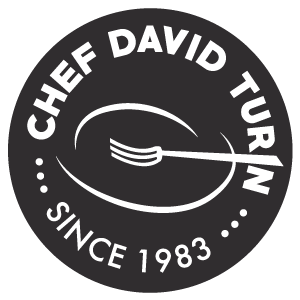Cooking What Matters at Chef David Turin’s Opus Ten
Originally published by Zest Magazine
By: John Golden
Photography: Matt Cosby
Foie gras, caviar, truffles, quail, lobster, lamb saddle and copious amounts of butter set the stage for the sheer brilliance of Chef David Turin’s gateway of gastronomy, David’s Opus Ten in Portland.
“It’s called Opus Ten,” David says, “because it’s my 10th restaurant. But it should have been called ‘Opus Last,’” he chuckles.
Last Opus? Not yet.
Speaking candidly about his restaurant, David says, “We’ve completed our seventh year and each summer, when we reopen from mid-June through mid-September, I always think about making some changes.”
What’s on the 2019 menu will depend on what’s available at the market. The Portland Wednesday farmers’ market operates right in front of the restaurant spring through fall.
“One year there was an abundance of local morels and they became a star ingredient on the menu,” he says. “I suppose you could call it a front-door-to-table restaurant, but I like to think of it as a menu of farm fresh.”
Although Chef David has indeed run or owned 11 restaurants in the past 36 years, his other current ventures are David’s Restaurant, which has been in operation since 1992, and David’s 388, in South Portland, a highly popular neighborhood bistro.
Opus Ten is located behind David’s in a separate room. Seating begins at 6:45pm and dinner commences by 7:15. The tasting menu starts with the cocktail cart making the rounds.
“After that we serve a trio of hors d’oeuvres such as fried arborio-rice-crusted oysters, porcini mushroom shooters and truffle foam and spicy honeyed goat cheese.”
Some of his favorite main dishes in the tasting progression include butter-poached lobster; grilled quail; Tournedos Rossini with Madeira demi-glace, seared foie gras and black truffle; an intermezzo of blueberry-lemon and thyme sorbet; and a classic pistachio-almond dacquoise.
“It’s old fashioned and if I had unlimited money and unlimited time that’s how I would want to eat every day,” he says.
“One time a group of diners came in and admitted that they had just been to Per Se in New York where dinner was $700 for two. Here, they boasted, dinner was only $250 for two and just as good.”
“When we first opened about seven years ago,” David says, “we sort of got off on the wrong foot. Very stiff and formal, white tablecloths, and diners worried about using the wrong fork. It was managed by a brilliant dining room captain who took his wines seriously and administered service that evinced the style of the last century.”
Four years later, Opus Ten has lightened up.
“Gone are the white tablecloths and any hints of pomp and circumstance,” he says. “I’m a casual guy. I thought formal, classical cooking was the type of restaurant I wanted to do so I could present dishes with exquisite sauces dressing masterful preps.”
Turin classifies his Opus Ten menu as “ambitious cooking without being weird.”
Some pundits have poked fun at the menu saying it’s old hat—a style of dining that doesn’t exist anymore with dishes that have been around the block.
But once you experience it for yourself, you realize this: While he relies on the tenets of French haute cuisine, it’s transformative cooking as he flexes a modern American muscle that’s no less rich or classic but very contemporary.
“I’m not afraid to use lots of butter and cream, reduced stocks,” he says, “but really the cooking is based on what’s at the market—produce from small farms and all the wonderful local fish and meats.”
That said, diners revel in such dishes as local scallops with smoked salmon and Louisiana bowfin caviar. Or an extraordinary creation of angel hair pasta in a bath of nutty, sweet brown-butter nage enriched with shirred quail egg and pepper bacon.
“Or local lamb saddle,” David adds, “with porcini mushroom dust, an intense lamb bordo and applewood bacon lardon, local fingerlings, crispy kale and summer succotash.”
David feels so much restaurant cooking is influenced by what’s on television, which is kind of a funny phenomenon since “you can’t taste it.”
“Six to nine to 12 elements on a plate, so many things. But I think I have a simple palate and would rather have more courses of small bites. OK, what’s this? Just a consommé or the next thing is just a butter sauce or a simple sauté.”
Ultimately David’s cooking style follows the proviso less is more. “I say to my chefs: ‘The dish is done when you’ve taken everything off that doesn’t need to be there and just bring it back to what makes it matter.’”
